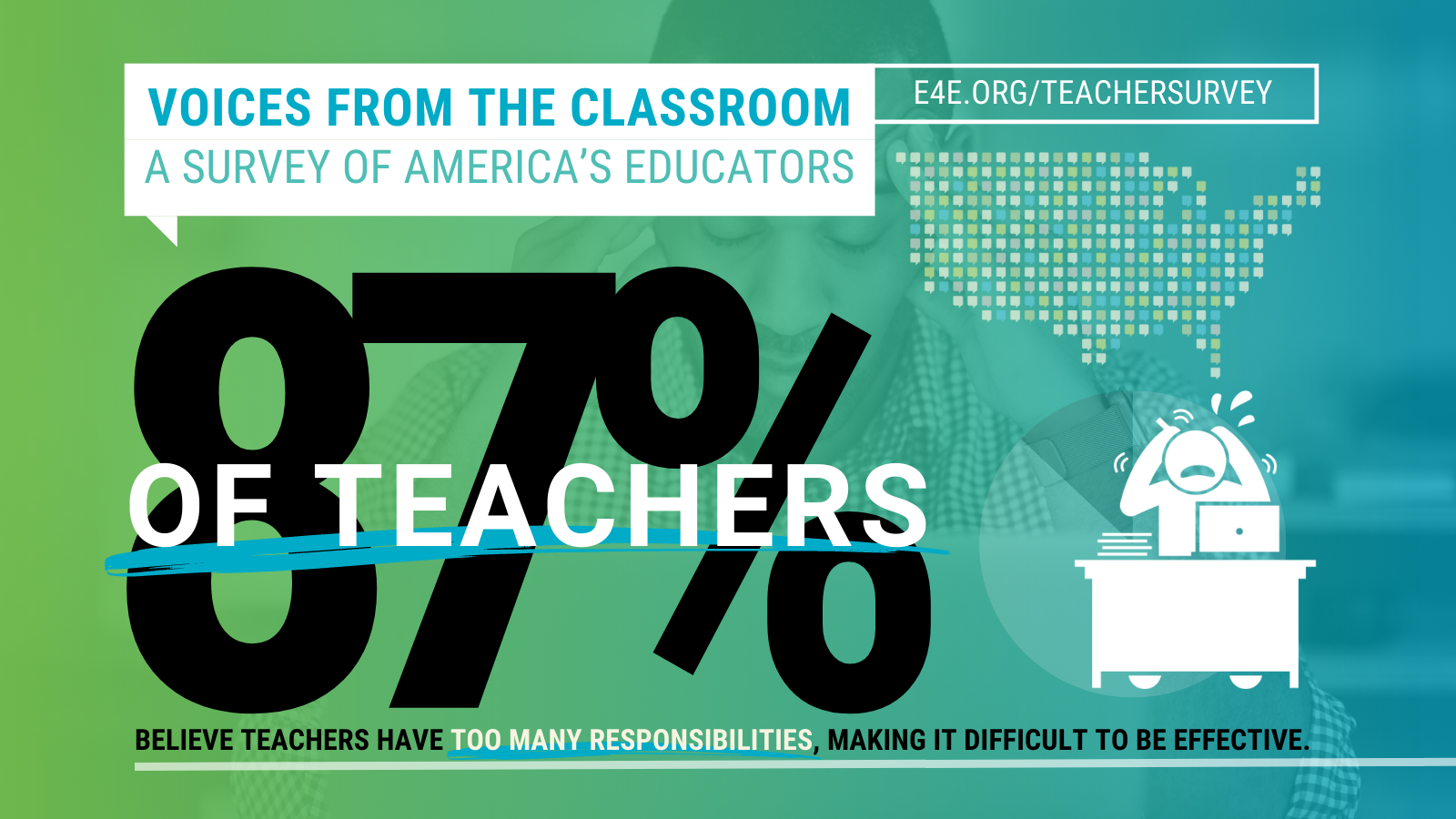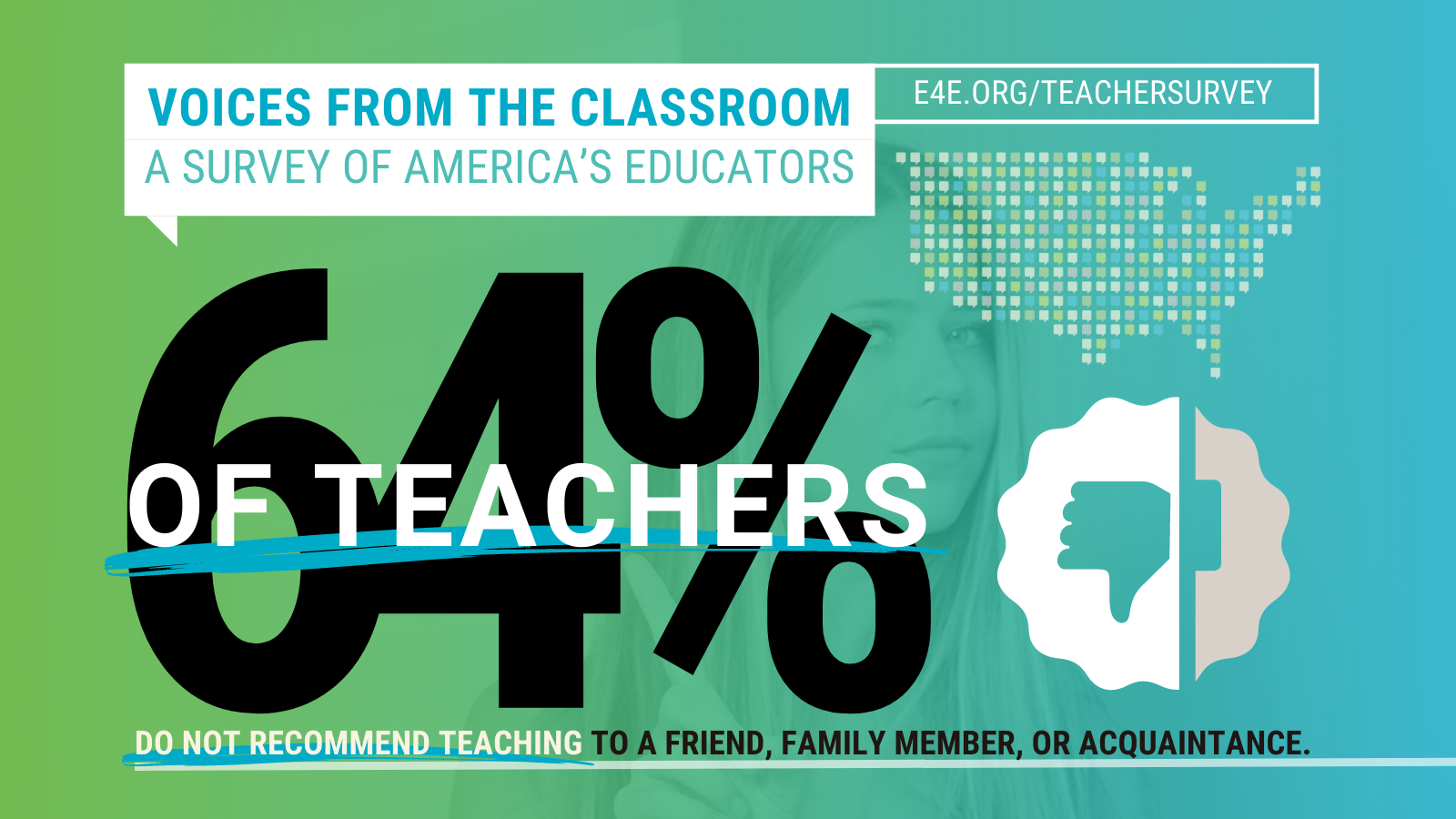Burnout Remains a Reality for Many Educators. What Support is On the Way?
It’s well known that teachers faced many challenges during the pandemic, but those new challenges often just piled on top of existing duties and magnified the persistent and growing number of responsibilities placed on teachers across the country. This reality has not gone away despite the dissipating urgency of the pandemic, as “the roles of schools and teachers have grown over time,” according to The 74M. In fact, the article notes that 87 percent of teachers agree they have too many responsibilities to be effective educators, citing the 2023 Voices from the Classroom survey. What else did teachers elevate? The Rodel team surfaced a few key areas to explore. Collaboration “First and foremost, [collaboration] means easing some of these growing pressures and responsibilities and increasing the amount of time in the day dedicated to teachers’ core responsibilities.” Teachers are often asked to take on more roles in their schools on top of their teaching responsibilities, and many times, without additional compensation. We also know this is particularly true for teachers of color, who are often asked to take on additional responsibilities, serve on committees, or be default leaders without additional pay, compensation, or recognition. Compensation “Next, teachers must be paid the compensation they deserve.” Teacher compensation has been an ongoing issue across the country for years. Educators are paid wages that ignore their expertise, working conditions, and the impact they have on students every day. Compensation has not kept pace with the role of teachers as they continue to get more added to their plate every school year. Not only has it not kept pace with the evolution of the teaching role, but the gap in pay between educators and their college-educated peers continues to grow. The Economic Policy Institute reported that in 2021, teachers earned 23.5 percent less than their fellow college-educated peers in other industries. Educators deserve to receive compensation that reflects their expertise, workload, and the incredible impact they have on students every day. Teachers need time for their own support/processing “It is important to acknowledge the importance of supporting the mental health of not just students, but educators.” “Providing mentorship and peer-to-peer growth opportunities and involving teachers in school and district decision making are concrete ways to not only bolster their well-being, but also bolster their effectiveness.” Education, more so than many other professions, can be extremely stressful. A recent RAND Corp. study found that teachers are nearly twice as likely as other working adults to report having difficulty coping with job-related stress, and 10 percentage points more likely to experience burnout. Beyond academic growth and attainment, educators are often asked to monitor their student’s well-being, including mental health. Still, few people know the amount that goes into being an educator and that their mental health can be compromised in such a challenging career. Educators benefit from time to process what is happening in their classrooms and having time to connect with their peers through mentorship or the sharing of opportunities to get involved in their districts. What is Rodel Doing to Support? Affinity Groups Nationally, we are facing a teacher shortage and Delaware has not been spared from this growing issue. Some of these issues can be attributed to the number of responsibilities that teachers have on their plates. And for teachers of color, this is exacerbated by the unique challenges they face because of their race. In addition to cultivating our next generation of leaders by teaching and supporting students, teachers of color face micro- and macroaggressions daily, making this work much more difficult. For anyone close to education or educators, it is not surprising to hear that educators are feeling burnt out and unsupported. One way that some districts in Delaware are supporting their educators is by implementing racial affinity groups. Work from The Black Teacher Project and Education Trust has shown that racial affinity groups can increase retention of teachers while also providing mentorship, affirming identity, and cultivating supportive relationships. Red Clay and Colonial school districts decided to pilot affinity groups in the spring of 2023 to create spaces for their educators of color and allies to talk and learn together. Rodel has supported the implementation by assisting with training and project management of this exciting opportunity. Racial affinity groups are not new; they are well known in corporate spaces and are growing in popularity for educators as well. In the pilot groups, our partner districts interviewed and selected affinity group leaders who were interested in creating brave spaces for their colleagues to either unpack the tough times they had within the school or create space for non-BIPOC educators to learn how to be strong and supportive allies. These spaces are unique because both Red Clay and Colonial intend to use feedback from these groups to understand issues within the district and take action to create an inclusive and supportive community that will encourage educators to stay in the classroom and stay with their respective districts. Teacher Leadership/Compensation To honor and respect the expertise of teachers, we must think innovatively about what teacher leadership is and how it is recognized both informally in schools and formally through compensation. Luckily, Delaware is beginning to dedicate resources to exploring this topic. In collaboration with the Delaware Department of Education (DDOE), Rodel is creating a teacher leadership committee, comprised of teachers working across the state. Their charge is to create an innovative teacher leadership model that is culturally responsive, as well as teacher and student-centered. The committee will be established later this fall and will look to national and local expertise of teachers and teacher leaders to create a blueprint for teacher leadership in Delaware, which will include: a working definition and job description, recommended teacher leadership staffing models, and a rubric for identifying culturally proficient and equity-centered teacher leaders. As part of Senate Bill 100, a subcommittee dedicated to exploring compensation for teacher leadership has formed under Delaware’s Public Education Compensation Committee (PECC). As members of the Rodel Teacher Network’s work group recommended, it is important to appropriately and respectfully compensate teacher leadership roles, while balancing the local needs of Delaware school districts. Through fair and appropriate compensation for the varied teacher leadership roles in schools, we begin to honor the expertise and impact teacher leaders have in schools every day. Related Topics: affinity groups, burnout, covid-19, Delaware education, delaware schools, middle grades, Red Clay School District, teacher prep, teacher voice, voices from the classroom
-Key themes from the survey include the need for collaboration, compensation, and time.
-Rodel and partners are working on several fronts in Delaware, from racial affinity groups to teacher leadership.



